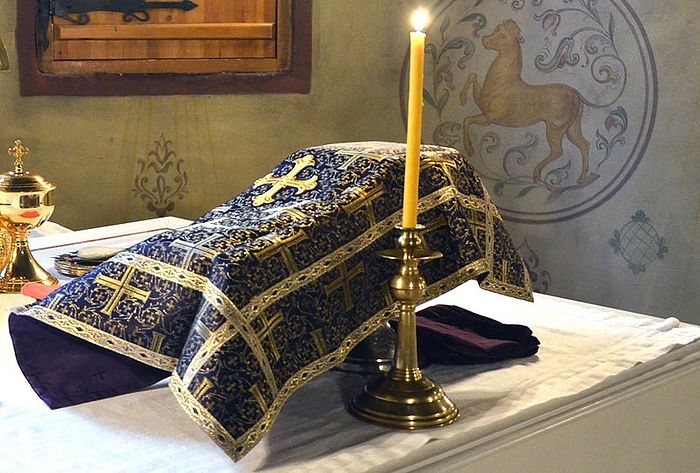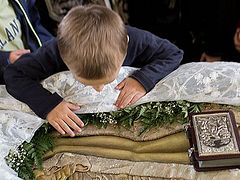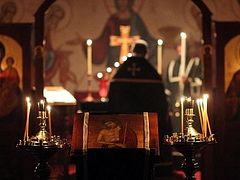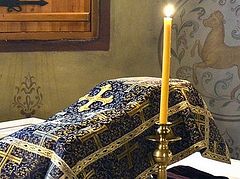This is not about the Liturgy that will be celebrated in the last hours of world history, and it’s not about the one that will be celebrated on the top of Mt. Athos in the last times, but about the Liturgy that is celebrated in the majority of Orthodox churches on Holy Wednesday. Yet again, we bid farewell to the Liturgy of the Presanctified Gifts, which, like any other, ends with a prayer behind the ambo.
The prayer behind the ambo is the first prayer a priest reads on the day of his ordination. In the rite of the Liturgies of St. John Chrysostom and Basil the Great, a petition is offered in this prayer for the fullness of the Church, for the hosts, for those who love the splendor of the house of God. It is a sign that from then on, the priest must pray to God for many people and various situations. But in the rite of the Presanctified Liturgy, this prayer is different.
It first speaks of the Lord as the All-Wise Creator. Then he gives thanks for the days of Lent, into which God has led us through His “ineffable providence and great goodness.” Lent frightens many at the beginning, but it flies by quickly, like an express train, and leaves a feeling of regret that “I didn’t manage to fast properly this time either.” Indeed, fasting should be treated not as a burden, but as a work of ineffable Wisdom and much goodness. And it is established “for purification of souls and bodies, for restraint of passions, and for hope of the Resurrection.”
***
Lent is directed towards Pascha. Without Pascha, our fasting is meaningless. Let someone somewhere fast as they want for other purposes. Christians fast in anticipation of the Resurrection and strive to purify themselves within and without, to feel the Paschal joy as much as possible. To recall this is not superfluous, and to remind of it is no burden.
***
Then the priest mentions Moses, to whom the Lord entrusted the tablets—the God-inscribed letters with the commandments—during his forty-day prayer. Moses had to break these stone tablets because, coming down from the mountain, he found the people raging and bowing down to a golden calf. Blood was shed and the most frenzied were punished, and Moses again ascended the mountain to receive the commandments again. These second tablets were later placed in the Ark of the Covenant, along with the manna and Aaron’s rod (cf. Heb. 9:4). But the influence of the commandments on the tablets was not limited to being kept in the Ark and read in the congregations.
The prophets saw something mysterious in the tablets. By the action of the Spirit, they understood that to correctly and consistently fulfill the commandments, they have to be written on their hearts, not just on tablets of stone. I will put My law in their inward parts, and write it in their hearts; and will be their God, and they shall be My people, the Lord says through Jeremiah (Jer. 31:33). That is, before the embedding of the laws of God in the inward parts and in the hearts of man, it would be a stretch to call any of the peoples the “people of God,” and only with qualifications. Living and thinking carnally, man is at enmity with God. Because the carnal mind is enmity against God: for it is not subject to the law of God, neither indeed can be (Rom. 8:7).
Man must be given a new spirit and a new heart, because it is entirely impossible to serve God with the old heart. David prayed about this: Create in me a clean heart, O God, and renew a right spirit within me. This is also prophesied by Ezekiel: A new heart also will I give you, and a new spirit will I put within you: and I will take away the stony heart out of your flesh, and I will give you an heart of flesh (Ezek. 36:26).
All of this has to do with us because we must enter into the fast for the sake of internal renewal and for the sake of engraving the laws of God on the fleshly tables of the heart (2 Cor. 3:3) with the chisel of the Spirit.
And so, having mentioned this—that is, Moses and the Law given to him, and also the prophecies of the New Law written on hearts, the priest prays the words of the Apostle Paul: “Grant unto us also, O Good One, to fight the good fight, to complete the course of the Fast, to preserve the faith undivided, to crush the heads of invisible serpents, to be shown to be conquerors of sins.” These words are both literally and in their general tone drawn from the letter of the Apostle to Timothy: I have fought a good fight, I have finished my course, I have kept the faith (2 Tim. 4:7). Only the Apostle speaks about what is already done, and we, taking the example of his words, entreat that we might also perform a good podvig, to make it through the fast, to keep our faith. We also add a petition for the destruction of our invisible enemies and the possibility of achieving without condemnation the goal of fasting—the Holy Resurrection.
***
As we can see, the sprit of Church prayer is the spirit of the Scriptures, and many Biblical expressions are completely sewn as by golden threads into the fabric of our Church prayers. A pastor who does not read the Bible will not understand the whole meaning of the prayers he reads, and the flock of such a pastor of necessity will be doomed to concentrate on all the secondary things, while missing the elephant in the room.
And let us also remind ourselves that that the very existence of a Liturgy like that of the Presanctified Gifts speaks to us of the impossibility of living for a long time without Communion. It is so unnatural for a Christian to go a long time without communing that true servants of the Lord, unable to wait for the next Saturday or Sunday, sought the chalice on Lenten weekdays, even without the Anaphora, only to be fed with the immortal food of the Body and Blood of the Son of God.
After reading the final prayer behind the ambo at the Presanctified service, there remain several days on the path to that night when the Lamb slain for the entire world will be presented under the image of a fatted calf for all who do not decline to attends God’s feast. And then pastors will sound forth everywhere with the words of St. John Chrysostom for everyone to come to the feast: both those who fasted and those who did not fast; those who labored from the third hour or those who came but one hour before midnight.
Because the Lord is good, “He accepts the deed, and commends the intention.”




